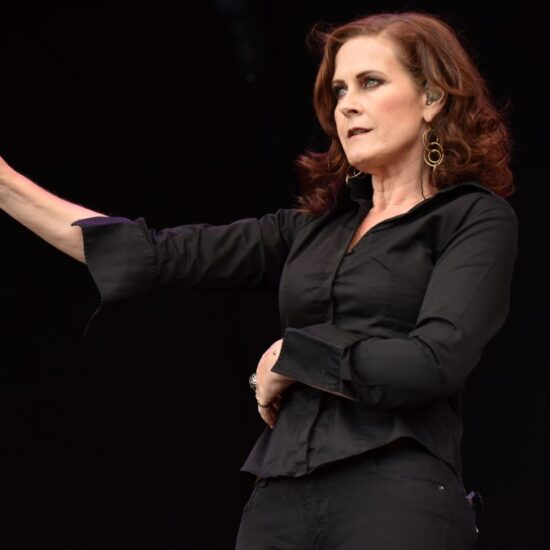
Set against a wildly colorful vision of high school, Sex Education has long anchored its storytelling on a simple yet powerful dictum: Sex and its attendant anxieties are central to every teenager’s own budding sense of self. With anxious yet wisened student sex therapist Otis Milburn (Asa Butterfield) at its helm, the series has tackled increasingly thorny issues surrounding everything from performance anxiety to gender dysphoria and quite literally all that’s in between. Riffing off (style-wise) 1980s Hollywood high-school-set comedies—both the raunchy and the romantic—the Netflix series, which drops its fourth and final season September 21, staked a claim for itself early on by unabashedly embracing the didactic potential of its premise. Its title served as a provocative promise: Not an episode goes by without the series teaching its viewers a thing or two about sex, intimacy, sexuality, gender, relationships, and even the benefits of therapy itself.
What began as a relatively modest proposition with Otis’ irreverent and underground school-set sex therapy staged in an abandoned restroom at Moordale Secondary, with every new client/patient of his structuring every new episode, has now, in its last season, ballooned into a sprawling ensemble-driven show that uses Otis less as an anchor than as a provisional (and almost immaterial) center of gravity for its many-pronged subplots. In a way, season four of the show feels at once like a much-needed reboot of the series while necessarily serving as a table-setting ending for it.
Long gone is Moordale Secondary, and that means that a new school year brings with it a new school altogether. Enter: the pastel-colored and student-driven utopia of Cavendish Sixth Form College. With its sound bowls, slides for stairs, bee-keeping classes, and personal tablets for all students involved—not to mention a kindness-first sensibility impressed upon at every turn by the ever effervescent queer group of kids that welcome Otis & Co. into their orbit—Cavendish proves a perfect space for Sex Education to try and reset itself. Otis is once again keen on starting up his practice at school all while the likes of Eric (Ncuti Gatwa, still the show’s MVP), Aimee (much-deserved BAFTA winner Aimee Lou Woods), Ruby (Mimi Keene), Jackson (Kedar Williams-Stirling), Cal (Dua Saleh), and Viv (Chinenye Ezeudu) struggle to navigate this new environment, which brings in a bright-eyed cast of characters, including rival student sex therapist O (Thaddea Graham) and happy-go-lucky couple Abbi and Roman (Anthony Lexa and Felix Mufti). Add in Maeve (Emma Mackey) adjusting to a semester abroad in the U.S., Jean (Gillian Anderson) learning to be a single working mother once more with a newborn in tow, Isaac (George Robinson) bridging new friendships at Cavendish, and Adam (Connor Swindells) deciding to follow his own path away from school altogether, and you’d be forgiven for thinking the series has bitten off more than it can chew.
To be sure, there are moments when this final season feels overstuffed. Ostensibly framed by Otis’ newfound rivalry with O (which leads to a school-wide election that devolves into an Alexander Payne-esque subplot), this eight-episode sendoff often struggles to balance the many (oh so many!) storylines it sets up. In trying to create a welcome mosaic of Cavendish’s many students (not to mention the various characters outside of its school like, say, Jean’s wilder younger sister who comes to help her with the baby), Sex Education often fails to really flesh out its otherwise keenly observed plots. This is particularly the case with the season’s better-known guest stars: Dan Levy as Maeve’s writing teacher in the U.S. and Hannah Gadsby as Jean’s new boss at a local radio station are given so little to play with that it’s no surprise to find both merely offering up versions of their offscreen personas.
And yet, when the show zeroes in on an affecting setup on the one hand (say, Eric struggling with his faith as an openly gay man at his church, Aimee finding a way to deal with her trauma through art, Cal working through their own gender dysphoria) or a hilarious one on the other (Otis struggling with taking an apt nude to send to Maeve, Adam learning to ride a horse, Jackson learning the joys of prostate stimulation), it serves as a reminder that there is no other show like it. A funeral episode, for instance, manages that tonal balance perfectly, capturing how grief can feel both liberating and claustrophobic in equal measure—all while giving us the kind of laugh-out-loud needle drop we’ve come to expect from this way too-cool-for-school series.
Such moments are elevated by the show’s game cast. Butterfield and Mackey (even though they’re separated for much of the season) prove once again they have crackling chemistry, while Anderson, here given a chance to play a frantically frazzled version of Jean, is clearly having a ball as the maybe-not-so-sane adult in the room. Even the show’s newcomers make for a welcome addition to the show’s cast, weaving in an ever queerer vision of what a sex-positive high school experience can feel like.
But arguably, Sex Education has long belonged to Gatwa and Wood. What they have accomplished with Eric and Aimee, respectively, is nothing short of extraordinary. Two supporting characters who would have otherwise been defined if not outright constrained to being merely the “best friend” have, over the course of four seasons, become the beating heart of Sex Education, with each actor finding newer shades to play in these wide-eyed teenagers who earnestly want to look at the world with awe and wonder even as they navigate often hostile settings. This final season gives them both the perfect sendoff as they come into their own and set themselves up for a fruitful life beyond the hallways of Cavendish.
Overall, season four of Sex Education delivers a welcome final lesson for all involved—and, in the process, puts a nice little bow on everyone’s stories. Which is not to say everyone gets the happily ever after they would want. But there’s a sense of finality that brings the show’s themes of inclusion, acceptance, self-love, and self-improvement full circle. And so, even when it stumbles—especially in its almost oppressive understanding of sex and desire as being needlessly wedded to coupled relationships—the series remains a watershed moment in the way it fused entertainment and didacticism, making a mark for itself as proof that we would all be better off talking openly and frankly about our many hormonal urges (sexual and otherwise).
Sex Education season 4 premieres September 21 on Netflix














